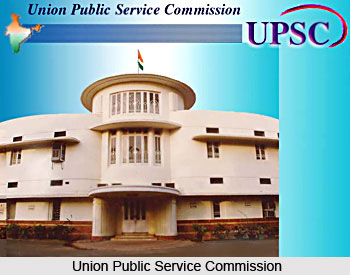 The Union Public Service Commission is one of the important Constitutional Bodies in India which has been formed to recruit various civil servants of the country by conducting competitive examinations. Originally the first Public Service Commission was constituted by the British Government in the year 1926. Article 315 of the Constitution provides for the creation of Public Service Commissions both for the Union and the States and also for Joint State Public Service Commission. According to Article 316, the Chairman and other members of the Union Public Service Commission will be appointed by the Indian President who may by regulations determine the number of members of the commission and their conditions of service and for the staff of the commission.
The Union Public Service Commission is one of the important Constitutional Bodies in India which has been formed to recruit various civil servants of the country by conducting competitive examinations. Originally the first Public Service Commission was constituted by the British Government in the year 1926. Article 315 of the Constitution provides for the creation of Public Service Commissions both for the Union and the States and also for Joint State Public Service Commission. According to Article 316, the Chairman and other members of the Union Public Service Commission will be appointed by the Indian President who may by regulations determine the number of members of the commission and their conditions of service and for the staff of the commission.
History of Union Public Service Commission
As long as British East India Company ruled over India, it did not feel the need and necessity of having Indians in the civil services. The Company had its own rules and regulations for the recruitment of personnel for manning their services. It was after 1885 that consciousness came among the Indians and they gradually began to demand a share in running their own administration. But conditions did not materially improve for long. It was only in 1919 that a provision was made for setting up a regular service commission for recruiting personnel for running the administration and services in the Government of India. But it took the government about 6 long years to implement the provision. It was only in 1926 that the first Central Service Commission was constituted. The Government of India Act 1935 also provided for setting up a Federal Service Commission.
Composition of Union Public Service Commission
The number of members of the Union Public Service Commission is seven including the chairman. As nearly as may be, one half of the members of every Public Service Commission shall be persons who at the dates of their respective appointments have held office at least for 10 years under the Government of India. A member of the Union Public Service Commission will hold office for a term of 6 years or until he attains the age of 65. All the appointments are made by the Indian President who is also dismissing authority in their case. But dismissal can be made only when a member has been charged with misbehaviour and such a charge, after investigation, has been established by the Supreme Court of India. He can also be removed from service, if he has been declared of unsound mind, insolvent, a disqualified citizen or he got gainful employment outside his official responsibilities, without prior approval of the government. The chairman and the members are ineligible for reappointment after retirement. The Forty-second Constitutional Amendment Act, 1976 provides for the creation of an All-India Judicial Service Commission by Parliament by law.
Functions of Union Public Service Commission
The functions of Union Public Service Commissions have been laid down in Article 320. The duty of the Union Public Service Commission will be to conduct examinations for appointment to the services of the Union. The Union Public Service Commission may, if requested by any two or more states, assist them in framing and operating a scheme of joint recruitment for any services for which candidates possessing special qualifications are required. The commission has a right to be consulted on all matters relating to methods of recruitment, principles of appointment, in making promotions and transfers from one service to another, on all disciplinary matters affecting a government servant Parliament may by law confer additional power to be exercised by the commission. All expenses of the commission will be charged upon the Consolidated Fund of India.
The Public Service Commission is required to submit annually to the President a report as to the work done by the commission and on receipt of such report the President shall cause a copy of the report to be laid before each House of Parliament. It is also the duty of the Union Public Service Commission to summit a monthly report to the President and then after the report is examined by the President it is sent to each House of Parliament.
Impartiality of Union Public Service Commission
In order to ensure the impartiality of the Union Public Service Commission, the Commission has been declared an independent statutory body, which is responsible to the Parliament, through the Ministry for Home Affairs, for all its activities. The appointments in the commission are made by the President and thus both in the cases of appointment and dismissal the political government has no hand. Similarly, the members of the Service Commission will continue to hold office for a fixed tenure, during their good behaviour. As a further measure towards securing impartiality, it has been provided that during the tenure of their office and after retirement the members of the service commission shall not accept any gainful employment without the prior permission of the government.






